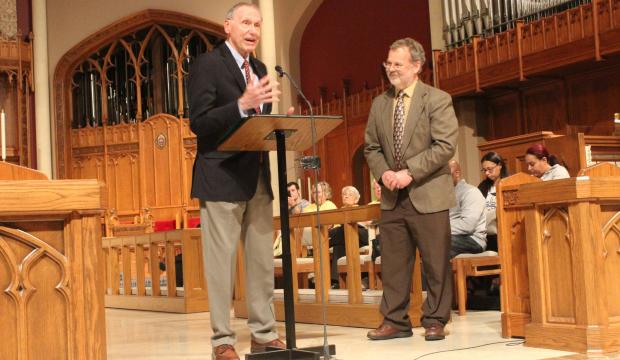April 25, 2017. The Topeka Capital-Journal.
A boisterous crowd in downtown Topeka’s Grace Episcopal Cathedral gave booming cheers as Topeka and Shawnee County officials agreed to tackle mental health, affordable housing and transportation — issues affecting many disenfranchised Topekans.
Topeka Justice Unity Ministry Project, more commonly called JUMP, brought members of 20 Shawnee County churches together for a “Night of Justice,” where officials, including Mayor Larry Wolgast, agreed to explore:
- A partnership between Valeo Behavioral Health Care and the Shawnee County Department of Corrections that would provide a supported employment specialist for inmates upon release.
- An affordable housing fund that, with the help of public funds, would support improvements to Topeka’s affordable housing stock.
- The “Topeka Workforce Route,” a bus route that would provide rides south of town to Mars Chocolate plant.
“This attendance tonight is evidence we are building a culture of justice in our congregations,” Eve Kendall, of Central Congregational Church, told the crowd of nearly 1,000 people.
Bradley Bowersox came to Topeka in 2014 to reunite with family. He told the crowd he struggled to hold a job and soon couldn’t afford the cocktail of medications he needed to combat anxiety related to post-traumatic stress disorder. While off his medication, he became convinced late one night that people were breaking into his home. After making his fifth call to 911, he was arrested.
Bowersox likely could have benefited from a program called supported employment services, which pairs people with certain mental illnesses with a liaison who works with employers to help them understand mental health needs, said Bill Persinger, CEO of Valeo Behavioral Health Care.
“It’s saying, ‘Hey, here’s this employee who wants to work, but they have some challenges, so here’s some ways we can support them,’ ” Persinger said.
Valeo currently employs 10 such counselors, but Persinger and Brian Cole, director of the Shawnee County Department of Corrections, told the crowd they were in the midst of developing a partnership that would provide a counselor for inmates. That position would identify inmates eligible for supported employment and work with them while incarcerated and immedately after release.
“We need to end the stigma of mental health illness,” Cole said.
JUMP last year asked city officials to look into establishing a fund to support improving affordable housing. About $500,000 has been earmarked out of the more than $10 million left over in the city’s share of the countywide, half-cent sales tax. Last week, the city council tabled the matter until May 16 to confirm the funds can be used for housing, but Mayor Larry Wolgast said he hopes it will be seed money for a fund to which foundations, corporations and private citizens can donate. As funds grow, they would be allocated for housing rehabilitation and upgrades and other projects.
JUMP had requested a goal of $2 million in funding for the program. The concept mimics programs the city funds through about $2 million from the U.S. Department of Housing and Urban Development.
JUMP members have long called for extending Topeka Metropolitan Transit Authority bus service south to employers like the Mars production facility. Paying for the extended service is the main hangup, but Metro general manager Susan Duffy said TMTA plans to pitch a new route called the “Topeka Workforce Route,” which would serve the southern industrial area.
“I hear this when I ride the bus: ‘I need to work where I can get paid more,’ ” Duffy said. “So why not?”
View original article.






